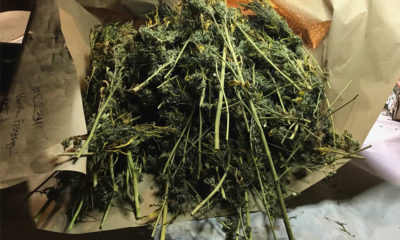
Joint Opinions
Farming On the Edge
Emerald Triangle farmers grow worried as California bureaucrats fumble their way through legalization — costing growers big in the process.
Farmers are worried. We are worried and tired of continually getting slammed with new rules and regulations. And don’t even get me started on taxes. Just when you think things are beginning to settle into some sort of acceptable pattern, they slap you again and you just have to figure out how to deal with it.
The latest was a splash email sent out to all applicants to the California Department of Food and Agriculture cannabis cultivation license program. It was a warning that if you don’t have your Annual Permit in process — and almost completed — by the time your Temporary Permit expires, you are basically screwed. Well, they didn’t exactly use those words, but it felt like they did.
There are now almost 7,000 Temporary Cultivation Licenses issued across the state of California. Each of those represents a hard-working farmer who is determined to become legal. These are a small fraction of cannabis growers who have stuck in the game thus far and do not intend to strike out now. Turns out it’s an expensive and time-consuming sport. Maybe if we’d all known how much so when we started to play, we would have walked away from the field. But here we are, tens of thousands of dollars into it, bound and determined to finish the game.
From my vantage point in the heart of the Emerald Triangle, it’s like watching a fog creep over Mendocino County, obscuring thousands of cannabis farms which will eventually fade into oblivion. There are a handful of clearings where a few survivors tentatively hang on. In the distance are the Big Guys, with large open fields of green, flourishing in the sunlight — the corporate giants itching to be able to put “Grown in Mendocino” on their labels. They want to claim they grow “heritage craft cannabis,” even if they arrived from another state, or country, only a few months ago.
It’s just not the same thing as pioneer cultivators on longtime farms hidden deep in the hills.
“Three years from now there won’t be hardly any growers left in the mountains, you watch,” predicts Tim Blake, founder of The Emerald Cup. “By the time Fish and Wildlife gets done with everyone, fewer than half the people who think they’ll survive now — they simply won’t survive.”
It’s starting to feel like the same old story, just those grumpy farmers complaining again. Even our Board of Supervisors doesn’t want to hear about it anymore. But the anxiety is palpable – the fear level is rising as we approach the Third Extinction Event.
The First Event was Jan 1, 2018 when the new law went in to effect. The Second Event was July 1, 2018, when people were told there would be an extension, but the rules were changed anyway and people were not prepared. The Third Extinction is starting now.
Most farmers have Temporary Permits, which began to expire in February and will continue expiring through July. The reason they are expiring is the absurd time limit set in the state law combined with a logjam of thousands of applications to the CDFA, which has totally overwhelmed them and their new computer program. In 12 months, they have awarded just four Annual Licenses. The procedure for coming into compliance is so complex and time-consuming, the small farmers need to hire expensive professional help. Many applications are incomplete because they are still waiting on clearance from other agencies to complete their submissions.
If the state does not come up with an emergency fix soon, another group of our already vanishing breed of craft cannabis farmers will go bankrupt and lose their farms. No doubt some of these will be “originals” who were literally the first to sow Her seeds in the Emerald Triangle. These are the farmers who have voluntarily come forward to enter the legal market, and they won’t be able to return to the illicit market because now the state knows exactly where they are.

For those farmers who have already applied for their Annual Licenses and are in process of hopefully getting approval by the Department of Fish and Wildlife, chances are good they will receive a “Provisional Permit” and be good to go until their Annual is complete. But if they are among the approximate 4,000 who did not submit their Annual Applications in time, they may have to begin the entire process all over again. At the rate they are progressing, that will take a very long time — long enough to put many farms out of business.
I recognize that opening any kind of business can be a challenge and the government will always do its best to impose as many rules and regulations as possible, especially here in our beloved California. But in the cannabis profession, yet a whole other level of stipulations enters the picture. I envision legislators staying up late at night, drinking alcohol and snorting coke, contemplating how to torture us next. We represent the lazy, good-for-nothing hippies who avoided paying taxes for years, I know it.
The mess we are now facing can only be blamed on the legislators who know nothing about cannabis and so made bad laws, and the unknowing bureaucrats who created such unwieldy, stringent, punitive regulations. Each law change means more work for the staff at the Department of Food and Agriculture, the Bureau of Cannabis Control and the Department of Public Health, who are already swamped with thousands of permit applications. The ones I really have compassion for are the very helpful staff at CDFA. Somehow, they almost always have a smile in their voices when I call, even though they must be inundated with callers. We may grow cannabis, but they cultivate patience at CDFA.
There is no question that it will still take several months for the various agencies involved to catch up. If a solution is not found to supply Provisional Permits to as many farmers as possible, many people predict that by early summer there will be a shortage of flowers and other products on the shelves of cannabis retail shops across the state. Naturally, the Big Corporate Boys will manage to get some permits, so there will be generic cannabis available, stuff that has been grown indoors or in giant greenhouses. The small farmers will be the ones to suffer the most, along with the small manufacturers, distributors, shops and all their thousands of employees.
The glimmer of hope on the horizon is SB-67, recently introduced to the State Senate by Senator Mark McGuire. This bill would allow Temporary Licenses to be extended so that businesses may carry on until receiving their full Annual Licenses. If it passes in the Senate it goes to the Assembly, sponsored by Assemblymember Wood, so it can take 60 to 90 days before finally reaching Gov. Gavin Newsom, who is expected to sign it into law. Such is the turtle speed of democracy.
As spring approaches, cannabis cultivators begin to consider their cultivars for next season and to prepare the soil and garden for the coming crop. Imagine living in the limbo of not knowing whether or not to start your seeds and prepare your gardens. Will the plants you start today, fully legal by California law, still be legal at the end of the month, if your Temporary Permit expires? And now they know just where to find you? Get the picture? Yes, this is every grower’s worst nightmare.
Prayers that this impending disaster is avoided are now being accepted. Thank you.
TELL US, do you support small farmers with your cannabis purchases?























